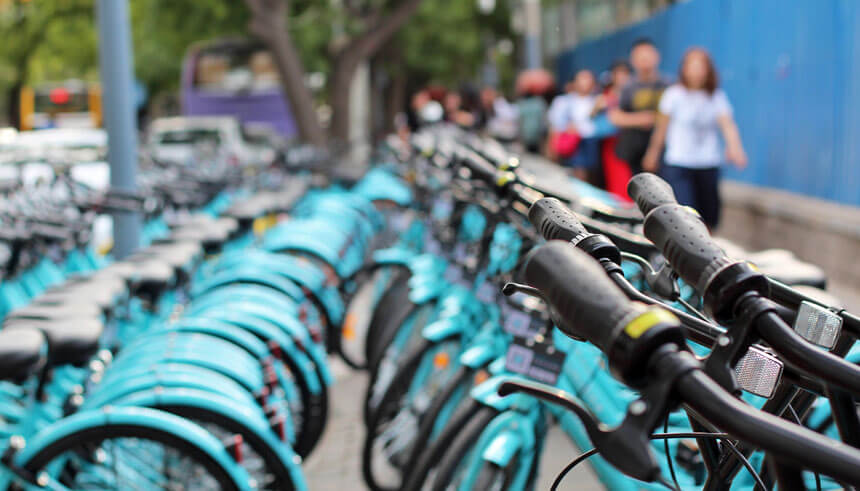Tech and Innovation
Wheelie Frenzy: Bike-sharing Trend Travels East to West

The craze over ride-hailing services spills over to bikes in China and around the world.
Call it Uber or Didi for bikes. Chinese startups Ofo and Mobike have taken the lead in this fast-paced, capital intensive and hyper-competitive sector with invented-in-China technology and business models. Both are now going global—a major leap from the former copy-to-China phenomenon that marked earlier, entrepreneurial China-only tech ventures. “The bike-sharing market shows China’s progress from copying Western business models a decade ago, to today inventing them and bringing those ideas to the west,” says Helen Wong, a partner at Shanghai-based Qiming Venture Partners and an investor in Mobike.
Thanks to Chinese startups Ofo and Mobike and their nifty, high-tech colorful bikes—canary-yellow for Ofo and bright orange for Mobike—bicycling in China has returned big-time. It’s arrived with the innovative twist of dockless bike-sharing: riders can find, unlock, rent, pay for and drop off bikes anywhere using a smartphone app with GPS technology and QR codes.
With rides costing no more than $1 per hour, communal bicycling has fast become the most convenient and affordable way to travel last-mile short distances in congested cities and colleges in China—and perhaps soon in Europe, the U.S. and Southeast Asia.
The boom in bike rental builds upon China’s unique sharing economy, where everything from umbrellas, to phone batteries, to basketballs are shared. The China market is projected by Guangzhou-based market consultancy iiMedia Research to reach $3.5 billion by 2019, from $1.5 billion in 2017.
Chinese competitors Ofo and Mobike have taken off in the past two years, each backed with $1 billion in capital that puts them in China’s growing sphere of unicorn companies. Now the two Beijing-based rivals are racing to expand outside China, reflecting a trend of leading Chinese tech companies going beyond country borders. Ofo has rolled out 10 million bikes across 15 countries in 180 cities (including four in the U.S., with additional launches in Colorado and Massachusetts soon), while Mobike has launched more than 5 million bikes throughout 100 cities in seven countries: China, Japan, Singapore, U.K., Thailand, Malaysia, Italy and the U.S., with Washington, D.C. as its first American foothold. Inspired by this initial success of the China contenders, international competitors have jumped into the market too, copying China—a huge step in the tech innovation world.
The bike-rental market, for all its dynamism, is not without risks and challenges. Several market pitfalls exist—bike theft and vandalism, Chinese government crackdowns on randomly strewn shared cycles, and hyper-competition that can lead to price-cutting, and too-rapid expansion without a solid business foundation. Already in China, two Chinese bike-rental startups, 3Vbike and Wukong Bike, have shut down this year due to losses from stolen bikes and poor-quality tracking systems.
But the founders of China’s dominant bike-sharing businesses look to the upside and embrace the challenges of fast growth. “We welcome the competition because it helps to educate the market about the benefits of bike-sharing,” says Ofo founder, Dai Wei, who formed Ofo as a college student at Peking University and named it Ofo because the letters resemble a rider on a bike. For Ofo, it’s all about expansion, then profitability perhaps as soon as late 2017, he notes.

"We welcome the competition because it helps to educate the market about the benefits of bike-sharing."
To help keep quality operational standards in this supercharged market, the startups have turned to incentivizing riders for support. For instance, Mobike successfully introduced a red pocket promotion that rewards bikers with free or discounted rides for parking at designated spots and reporting abandoned bikes, said Mobike’s CTO and cofounder, Joe Xia, a former manager at ZTE, Ford and Chrysler.
“The big risk with startups is always about executing on the business plan, and especially so in China,” observes Ravi Belani, cofounder and managing director of Alchemist Accelerator in Silicon Valley, commenting on the challenges facing China’s fast-growth, unicorn startups, Ofo and Mobike among them.
Both Ofo and Mobike certainly have tipped the unicorn scales, each raising more than $1 billion in capital this year from major corporates, strategic partners and venture capital firms. Since the beginning of 2017, Mobike has pulled in $1 billion, most recently $600 million during June in a deal led by Tencent with Sequoia Capital China, Hillhouse Capital and TPG. “We hope we can help Mobike go global as a model of China innovation,” comments investor Neil Shen, founding and managing partner of Sequoia Capital China, which is an early investor in several of China’s most successful startups.
Meanwhile, Ofo picked up $700 million in July, led by e-commerce giant Alibaba, along with Hony Capital and CITIC Private Equity, after luring $450 million in February from investment group DST Global and ride-sharing service Didi Chuxing.
Strategic investors are helping to groom these startups and help them expand. For instance, Mobike launched a mini-app on WeChat’s mobile messaging system, so users can scan and unlock a Mobike without leaving the WeChat app. Japanese Investment partner SoftBank has helped Ofo enter Japan.
A next stage in the evolution of these two biking rivals could be a merger. Reports have recently surfaced that investors in Ofo and Mobike are in talks to possibly merge to create one pumped-up player. If so, this move would repeat a familiar pattern that happened in 2015, when taxi-hailing rivals Didi Dache and Kuadi Dache joined to create a powerful contender, Didi Chuxing, which acquired Uber’s China business in 2016. In an interesting parallel of investors, Tencent backed taxi-hailing service Didi Dache and has funded Mobike; Alibaba invested in Kuaidi Dache and has backed Ofo.
In a significant milestone, these fast upstarts have in turn inspired copycats in overseas markets. San Francisco startup LimeBike has launched in nine U.S. cities and eight college campuses since it was started by founder Toby Sun and supported by $12 million from venture firms Andreessen Horowitz, DCM Ventures, IDG Ventures and a Stanford University venture fund. Meanwhile, a Hong Kong-based bike-sharing upstart, Gobee, has jumped into the action, funded by a $9 million investment from the Alibaba Entrepreneurship Fund.
The bike-sharing parade that Ofo and Mobike continue to lead is central to the story of the country’s progressive wave of tech entrepreneurship over the past decade—from copied-to-China, to invented-in-China, and now copied (or inspired) from China.

